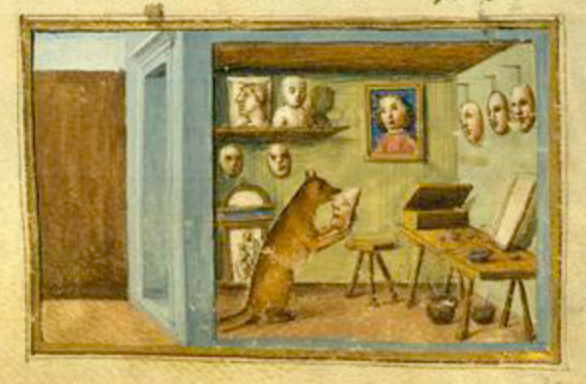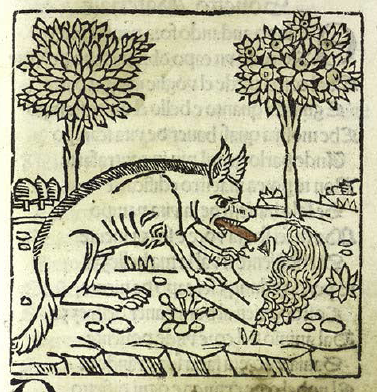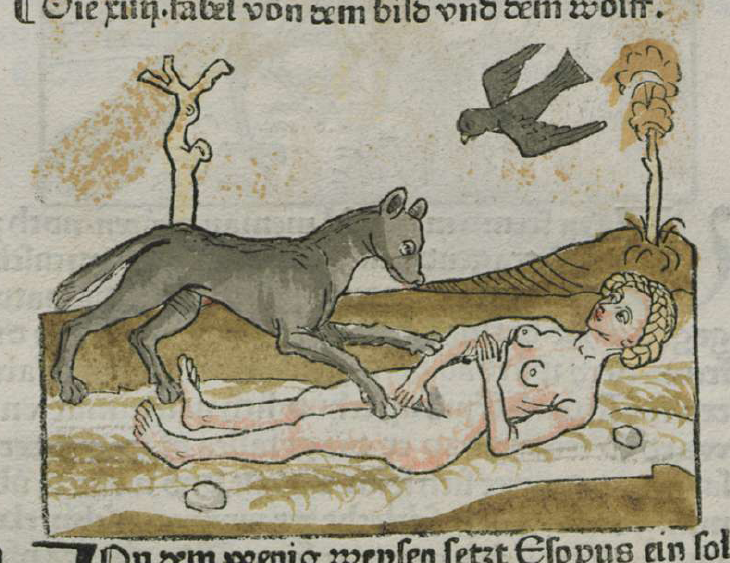Desbillons 4.1 Sus et Leaena
Fecunda Sus Leaenae vertebat probro,
Catulum quod unum quolibet partu ederet.
"Unum, at Leonem," retulit indignans fera.
Res dignitate praevalent, non copia.
Fecunda Sus
vertebat Leaenae
probro,
quod
quolibet partu
ederet unum Catulum.
Indignans fera retulit,
"Unum, at Leonem."
Res praevalent
dignitate,
non copia.
This is a fable that comes from the Greco-Roman Aesopic tradition, although it is sometimes a fox who addresses the lioness, rather than a pig. Given how many piglets a pig can have, however, that seems like the better choice, as well as heightening the lowly status of the mother-animal compared to the regal lioness.
The meter is iambic, and here is some help with the meter (for more about iambic meter, see the post about Desbillons 1.1).
Fecun · da Sus · Leae · nae ver · tebat · probro,
Catulum · quod u · num quo · libet · part~ e · deret.
Un~ at · Leo · nem re · tulit in · dignans · fera.
Res dig · nita · te prae · valent · non co · pia.
The other "one-liner" fable we read is from Phaedrus:
Phaedrus 1.7 Vulpes ad Personam Tragicam
Here is the poem written out in English prose order to help in reading:
The use of the tragic mask in this poem marks it as clearly Roman, and you can see illustrations here; I like the version in the Medici Aesop:
Personam tragicam forte vulpes viderat;
quam postquam huc illuc semel atque iterum verterat,
'O quanta species' inquit 'cerebrum non habet!'
Hoc illis dictum est quibus honorem et gloriam
Fortuna tribuit, sensum communem abstulit.
Forte
Vulpes viderat
tragicam personam;
postquam
verterat hanc (personam)
huc illuc
semel atque iterum,
inquit,
"O quanta species...
non habet cerebrum!"
Hoc dictum est illis
quibus
Fortuna tribuit
honorem et gloriam
(et) abstulit communem sensum.
The use of the tragic mask in this poem marks it as clearly Roman, and you can see illustrations here; I like the version in the Medici Aesop:

In some versions, it's a wolf rather than a fox... and just look what happens to the story in Caxton, where it's about "the wulf and of the dede mans hede," although the illustration shows a dead woman:

The meter is iambic:
Perso·nam tragi·cam for·te vul·pes vi·derat;
quam post·qu~ huc il·luc semel · atqu~ ite·rum ver·terat,
'O quan·ta speci·es' in·quit 'cere·brum non · habet!'
Hoc il·lis dict~ · est quibus · honor~ · et glo·riam
Fortu·na tribu·it, sen·sum com·mun~ ab·stulit.
Meanwhile, for more Desbillons, here are the other Desbillons poems I've posted so far here at the blog, and here is more from Phaedrus, plus some reconstructed Phaedrus poems.

No comments:
Post a Comment
Comments are limited to Google accounts. You can also email me at laurakgibbs@gmail.com or find me at Twitter, @OnlineCrsLady.